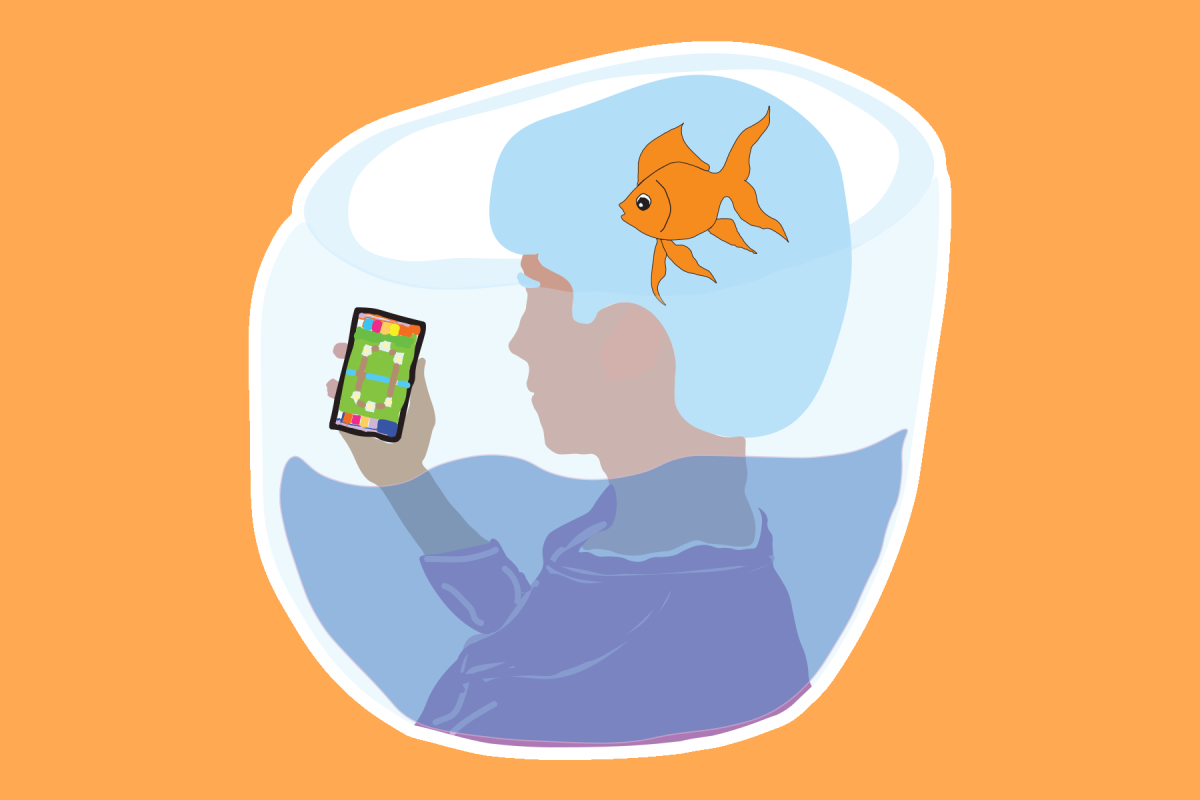Last week, NYU became the first major U.S. college to publicize its plans for device-free zones. Starting this year, classrooms across the university are becoming “phone-free,” forcing students to lock away their devices for about 80 minutes — roughly the time it takes to scroll through 320 TikToks. The move aims to help students focus, but it raises a bigger question: If this cannot fix our attention span problem, what can?
In 2015, a report declaring that the average attention span of a human decreased to 8.25 seconds — less than that of a goldfish — took internet psychologists by storm. The report was later disputed, but it’s hard to quiet the concerns it posed, particularly as the average screen time for college-aged students rises to 8-10 hours per day. TikTok users on average spend around 35 hours on the app per month — six hours more than the time spent monthly on YouTube, once the internet’s haven for flashy, addictive videos. Short-form content is only getting shorter, and students paying around $90,000 a year for an NYU education are stuck in a cycle of 10-second videos. Can you remember anything you scrolled through last night?
While I was taking a Tisch course on TV production over the summer, guest lecturer Julia Alexander, an in-house streaming industry expert at Puck, speculated that we no longer click around the internet with the intention of learning new things — but rather to mindlessly scroll. While the internet was once lauded for its ability to act as a vast encyclopedia that democratized information, it has since become decentralized in a way that better mimics — and in turn, stands in for — real-life social interactions. The days of joyfully exploring the novel depths of Wikipedia are over — now we care more about the dopamine hit of the next TikTok than knowledge we have inconceivable access to.
The habit doesn’t just impair cognitive function and worsen risk for a host of mental illnesses, but it invariably changes how we see the world around us. The consequences of our diminishing attention spans are overwhelming, and in many cases, we have simply lost the ability to care. Information overload leads to apathy, and that is precisely when our short attention spans become a real problem — when we scroll through wars, elections or climate disasters without a second thought. If students can’t focus long enough to finish reading an article for class, they’re unlikely to muster the attention long enough to reckon with the world around them.
Take one look around Bobst Library and you’ll see students pretending to study with their phones propped up against their laptops, TikTok playing on one side and a half-finished paper on the other. In lecture halls, professors now compete with video games, notification buzzes, and screen mirroring from phones for attention. Even if NYU seamlessly implements its phone-free policies — which would be a commendable feat in itself — the unfortunate reality is that students will likely dart out of class and return to habit. Our brains are wired to crave the scroll over anything else.
There’s something comforting about turning your brain off when you don’t really want to work. It is much easier to have short sips of information from online media than to take in gulps of content, like your textbook. But it’s responsiveness to that very instinct that has worsened our well-being by making us feel as though our day was at odds with our goals . Studies find guilt to be one of the most relentless side-effects of an avid screen time, yet we can’t seem to shake the habit.
But what can we do to win our attention span back? One of my friends has switched to using a flip phone for personal calls and his iPhone solely for work, removing the ability to scroll endlessly. Another actually froze her phone in a block of ice. For those of us who may be a bit more dependent on the piece of metal in our back pockets, here’s some of my advice.
Try going for a walk in the city without your phone, and see how you notice the world differently. Hearing new things without headphones makes you appreciate the communities around you, and not worrying about your pocket computer might make you consider things you haven’t before. Alternatively, next time you’re locking in at Bobst, try turning your computer on Do Not Disturb before putting your phone away in your bag, then set a lock-in timer for two hours. Or find an app that locks you out of your other apps until the timer you set runs out. And if none of this works, perhaps it’s really time to put your smartphone in a block of ice and get yourself a flip phone.
WSN’s Opinion section strives to publish ideas worth discussing. The views presented in the Opinion section are solely the views of the writer.
Contact Annika Wilewicz at [email protected].


























































































































































